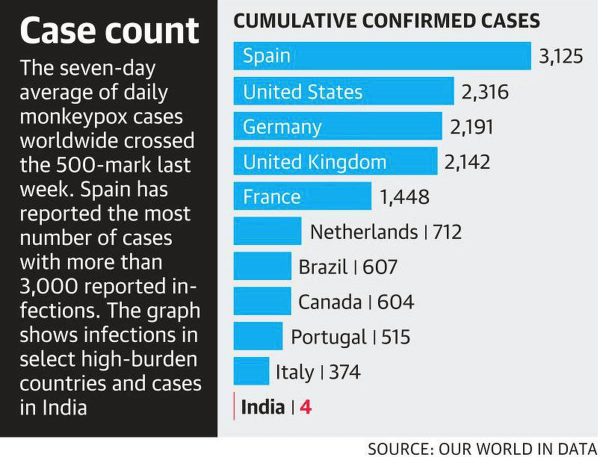Monkeypox is a zoonotic disease that is transmitted from infected animals to humans. It was first identified in monkeys way back in 1958, therefore it was named as monkeypox.
- It occurs primarily in tropical rainforest areas of central and West Africa and is occasionally exported to other regions.
- The monkeypox virus is an enveloped double stranded DNA virus that belongs to the orthopoxvirus genus, which is a genus of viruses that also includes the variola virus(which causes smallpox), vaccinia(used in small pox vaccine) and cow pox virus.
- There are two main strains of monkeypox virus:
- The central African (Congo Basin) clade: caused more severe disease and considered as more transmissible.
- The West African clade: It has been identified among the current cases, however less virulent.
- Various animal species have been identified as susceptible to monkeypox virus. This includes rope squirrels, tree squirrels, Gambian pouched rats, dormice, non-human primates and other species.
- According to W.H.O, there is uncertainty on the natural history of monkeypox virus, although rodents are suspected to play a part in the endemic setting and further studies are needed to identify the exact reservoir(s) and how virus circulation is maintained in nature.
- The diesease was first identified in humans in 1970 in the Democratic Republic of the Congo in a 9-month-old boy in a region where smallpox had been eliminated in 1968.
Transmission
Animal to Human transmission:
- It can occur from direct contact with the blood, bodily fluids or cutaneous or mucosal lesions of infected animals.
- Eating inadequately cooked meat and other animal products of infected animals is a possible risk factor.
Human to Human transmission:
- Monkeypox virus is transmitted from one person to another by close contact with lesions, body fluids and contaminated materials such as bedding, clothing or eating utensils.
- People who closely interact with someone who is infectious, including health workers, household members and sexual partners are at greater risk of infection.
- Transmission can also occur via the placenta from mother to fetus (which can lead to congenital monkeypox) or during close contact during and after birth.
Monkeypox : Sign and symptoms
- The disease is usually a self-limited disease and typically lasts 2 to 4 weeks.
- The incubation period is usually 6 to 13 days but can range from 5 to 21 days.
- Typical symptoms include fever, headache, muscle aches, backache,lack of energy, swollen lymph nodes and a skin rash or lesions.
- Swelling of the lymph nodes (lymphadenopathy) is a distinctive feature of monkeypox compared to other diseases that may initially appear similar (chickenpox, measles).
- The skin eruption begins within 1 to 3 days after fever onset. The rash often begins on the face, then spreads to other parts of the body.
- The rash evolves from macules (lesions with a flat base) to papules (slightly raised firm lesions), vesicles (lesions filled with clear fluid),pustules (lesions filled with yellowish fluid), and crusts which dry up and fall off.
Diagnosis
- Nucleic acid amplification tests such as Polymerase chain reaction (PCR) is the preferred laboratory test.
- Optimal diagnostic samples for monkeypox are from skin lesions, the roof or fluid from vesicles and pustules and dry crusts.
Monkeypox : Treatment and vaccine
- According to WHO, there is no treatment for it but vaccination against smallpox can be effective in preventing monkeypox.
- In the past, vaccination against smallpox was demonstrated to be about 85% effective in preventing monkeypox, however the original small pox vaccine are not available to general public as the world was declared free from smallpox in 1980.
- Tecovirimat is an antiviral approved for the treatment of monkeypox by the European Medicines Agency (EMA) in January 2022 and one vaccine (MVA-BN) was approved for the prevention of monkeypox in 2019.However,It is not yet widely available.
Current scenario and cases across the world (according to W.H.O)
- The global outbreak of monkeypox has grown to nearly 16,000 cases across 75 countries, including 5 deaths.
- The outbreak is heavily concentrated in Europe, the five deaths have been reported in African nations. Some countries are beginning to record a decline in cases, but six countries this week reported their first cases.

W.H.O’s Advice regarding monkeypox
- The World Health Organisation (WHO) has sounded its highest level of alert for monkeypox and declared monkeypox to be a global emergency on the 23rd July 2022.
- The WHO said that the monkeypox virus is containable with measures including the quick detection and isolation of cases and contact tracing.
- Avoid close contact with people who have suspected or confirmed monkeypox.
- People who are infected – and in some cases their close contacts – are advised to isolate for 21 days.
- Raising awareness of risk factors and educating people about the measures they can take to reduce exposure to the virus is the main prevention strategy for monkeypox.
- Captive animals that are potentially infected with monkeypox should be isolated from other animals and placed into immediate quarantine.
Rajasthan government take on the issue
- The state is on alert mode after monkeypox cases were reported from other states and WHO declared the escalating global monkeypox outbreak a Public Health Emergency of International Concern (PHEIC).
- Rajasthan government has issued guidelines for the passengers coming from Europe, Australia, USA, Canada into the state.
- Passengers who had flown down to Rajasthan from these states (Europe, Australia, USA, Canada) will have to go through the screening process. If the report of the suspected traveller comes positive, then contact tracing will be done.
- The Medical Health Department, Rajasthan has asked the authorities to screen the passengers and send the samples of the suspects to the National Institute of Virology (NIV) Pune.




